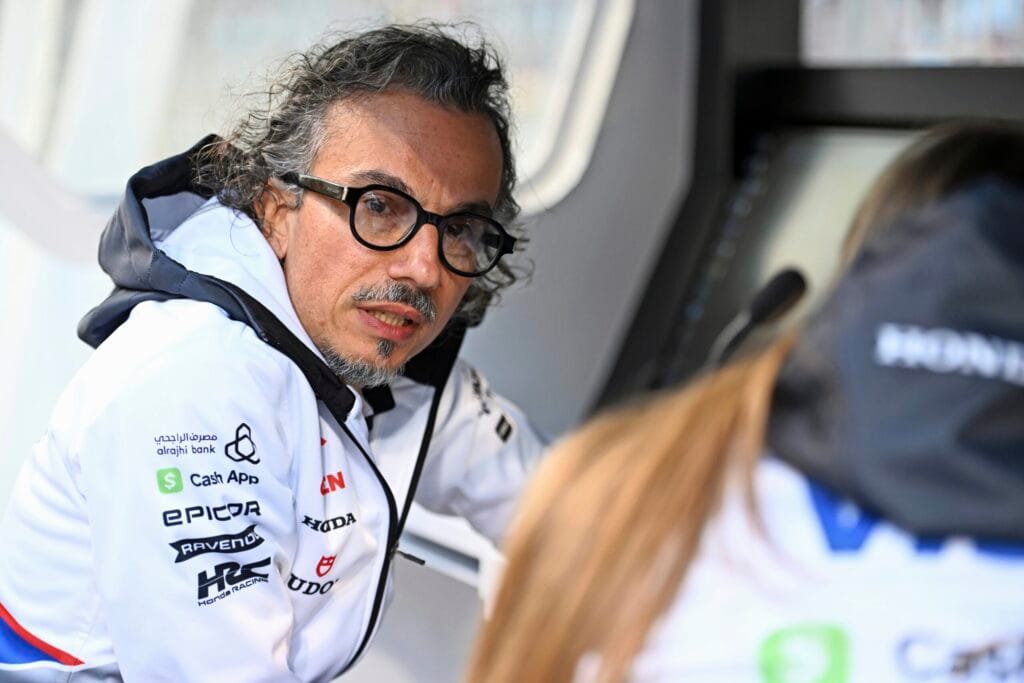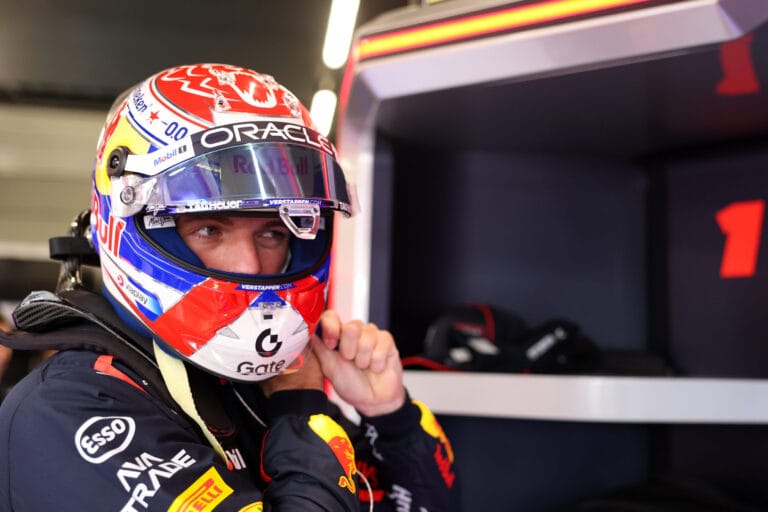From Racing Bulls to Red Bull Racing: Laurent Mekies was promoted to CEO and team boss of the latter on Wednesday, but who is he and what drives him? The successor to the dismissed Christian Horner once spoke in a previous interview about his personality, what he stands for, and how to successfully run a team: it’s time for an introduction.
His mood always seems radiant, according to Racing Bull press officer Fabiana Valenti, Laurent Mekies is almost always the sunshine in the house. The French intellectual is a ‘people person’, as he confirms in the entertaining but sometimes somewhat confusing conversation.
Respect, civility, and humility are core values for him. And although Mekies is the boss, according to Valenti, he is not very hierarchical. “I never have to get coffee for him, carry anything, or whatever. Laurent simply doesn’t think that’s necessary, he can do all that himself.” Just like his predecessor Franz Tost, the Frenchman has quickly become popular with the team staff.
Laurent, since your entry into Formula 1, you have become a team boss through a fairly stable curve. Have you always aspired to this, or did it just come your way?
“That’s a fair question. And I think the honest answer is that something like this comes your way. I don’t think we think so far ahead in time. Look, in Formula 1 we are all competitors and fans, I don’t know in which order. We love to compete, we love to win. We love the sport and everything we do is trying to contribute to it and also enjoy it. Every day again. And then the beauty of life is that you try to do that and along the way meet fantastic people, who shape you and also give opportunities.
So that’s how it actually went. The only really conscious decisions you make are probably the difficult ones, for example when you change jobs. But you don’t just do that with a view to a change in your career, you also do it with the idea of wanting to learn more.”
I ask because racers often have one goal very early in life, Formula 1.
“I think it’s good for young racers to have that ambition. In a way, you could say that working in Formula 1 was also an ultimate goal for me as a child, you know. And then you get here, and… What drives you is the desire to learn. That’s it.”
You’ve worked as an engineer for various teams for a long time, for a while at the FIA and also for Ferrari. What exactly is the biggest challenge in running a team?
“You know, the biggest challenge is making sure all your people have the right environment to perform.” Is it that simple? “Actually, yes.”
What kind of team boss are you? You say: I want people to work in the best environment they can work in.
“So we also chose to put people at the heart of the project, they form the basis of everything. Do I believe in a certain leadership style? No.”
Can you explain that?
“Of course. It comes down to the people you’ve been fortunate enough to work with and meet over the years, you know. I’ve worked with fantastic leaders and learned from them. Do they have similar styles? Absolutely not: they varied greatly. So, the style doesn’t matter. What’s important is leadership.”
What is your definition of leadership?
“I think it’s finding a way to inspire your people and enable them to perform at their best. That’s what leadership is to me.”
What is your leadership style?
“Considering that I believe style is not important, our approach, and I like to say ‘our’ because you can’t do anything alone, is that we want people to be at the heart of the project. Because we are a people project. Our success and failure will be based on how much we as a group are able to work performance-oriented: without any nonsense or blame. These are some of our core values that we hold very dear.”
You held a top position at Ferrari, yet you left. Was that a difficult decision?
“You know, I was in a very privileged position to go from an incredible place at Ferrari to another incredible place here, in the Red Bull family. To answer your question specifically: the kind of project that this project is, is a combination of a new team with the freedom that comes with it. Not a 100 percent new team of course, because the foundation is just like the history extraordinary. To that extraordinary foundation, you add a layer of freedom as in: let’s start a new project. This is such an opportunity, which does not come often. And you’re right: only for something that is so special, you can leave a team like Ferrari.”
You went from a huge team to a smaller team, which you know. Seems like a different kind of challenge.
“It’s different, but also really completely different. I’m not here to try to copy what I’ve seen elsewhere, because the challenge is very different. Look, the goal is to bring this team to the top of the midfield in a consistent way over the next few years. Then you just look at that and say: okay, what do we need to set in motion for that? Because it’s not going to happen just because we change the color of the car or the name of the team.
If your boss tells you what the goal is, you have to take it seriously as a serious goal. Then you go back and say: okay, what do we need to do to strengthen the foundations of the teams to bring us to the goal? And that’s one of the most beautiful challenges. And to come back to your question: then you try to make an analysis with what you know from other experiences.”
Would you have said yes to another team?
“It’s very difficult to find something in Formula 1 with more history than Ferrari. But I think the Red Bull family is unique when you see what it now means in motorsport. To answer your question: the fact that it’s the Red Bull family, that I’ve had the privilege of working for this team for over ten years already, and this is a new project, made the circumstances right to leave Ferrari. Because this is a very unique set of circumstances. It wouldn’t have applied to anything else in the pit lane.”
At Ferrari, the whole world is watching, not here. Do you notice that difference? Is there less pressure?
“There are many differences. I think the first direct answer is that it doesn’t feel the same at all. But that’s not a surprise, right? It’s also a good thing. Maybe if you go from one team to another, it feels more comparable. But that’s not the case here. When you talk to people with different backgrounds, you hear why some teams are unique.
And I’m sure Ferrari is unique in some ways, and I’m sure this team is unique in some ways too. It’s hard to give concrete examples for that. I think each team develops in a certain way that makes it very strong in some areas. I find that quite interesting, it’s the beauty of this challenge.”
What other skills do you need as a team boss compared to a role as chief engineer?
“If you look at it from the perspective of the people, it’s not very different. A race engineer runs half of the garage: he talks to his drivers, tries to get his mechanics to work as quickly as possible, coordinates a team of engineers, gets input from the factory at the same time, has a super short deadline, is under great pressure, is exposed to noise all the time and his voice goes around the world every time you press the radio button. I have enormous respect for all these people.”
You were once one of them.
“So do you need to have more in your arsenal to be a team boss? No. In my eyes, this role is a continuation of that.”
Why do you, as a Frenchman, enjoy working for Italian teams? And don’t use the cliché that the food is so good.
“Okay, I won’t. But the cliché is true, haha. Seriously though, I think it’s hard to find a place more welcoming than Italy. And I mean that in terms of how hospitable people are, especially in the workplace and beyond. I’m not saying it’s the main factor in my career choices, but it certainly creates a very privileged environment. And of course, you want to continue to evolve in such an environment. That being said, is the choice for Italy a conscious one in my decisions? Probably more unconscious than conscious.”
Is the Italian mentality so different from the French?
“You know, as much as we like to put a flag on everything, the truth is that all teams in Formula 1 are incredibly international. If you work in our engineering office, you’ll probably encounter ten different nationalities. I think there are about thirty different nationalities working in our team. There are many good things about Italy.
In terms of the working environment, the reality is that we in Formula 1 all work for international teams. Whether they are based in the United Kingdom, France, or Italy, you’ll find a very similar mix of nationalities everywhere. Although we operate from Italy, in reality, I don’t think it has such a big impact on the work-related part.”
But you still have a soft spot for Italian teams. Or was it a coincidence that you ended up at Ferrari?
“No, no. I absolutely wouldn’t have started if I hadn’t believed one hundred percent in what could be done. And I also think that we have done some great things.”
What do you want to achieve with this team?
“Well, as I said, the goal is clear: to bring this team consistently to the top of the midfield in the coming years. That’s the task we have, that’s the goal. So the answer to your question is very simple: we want to put a winning team on the track.”


